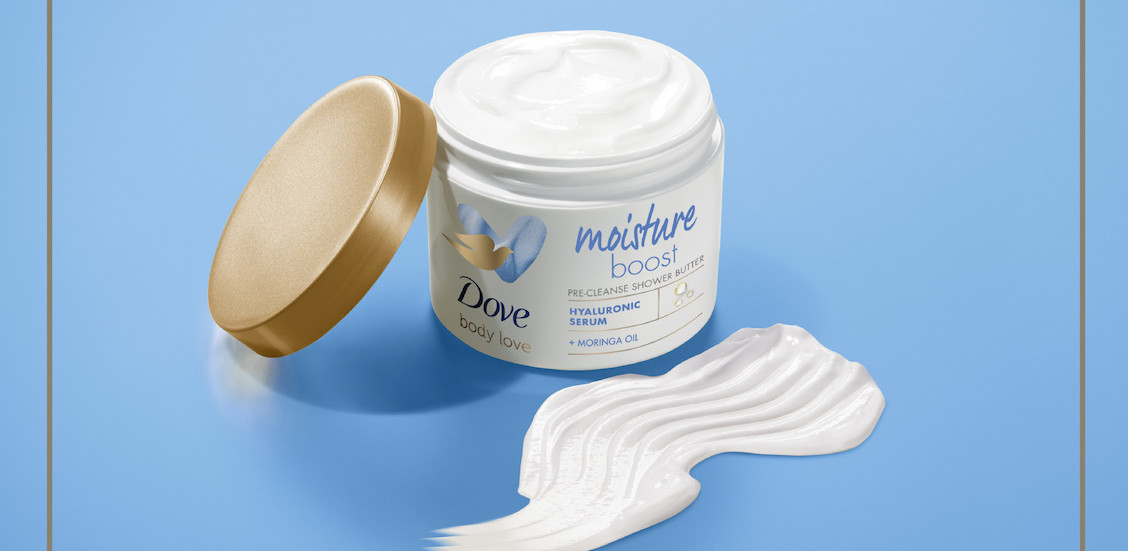Amid a larger premiumization trend within beauty and personal care, Dove is trying to get in on the action.
Over the past two years, premiumization has touched nearly all aspects of beauty and personal, from toothpaste to bar soap. For the most part, the trend has been led by indie brands including Nécessaire and Henry Rose with their nimbler ability to adapt to trends. But a new premium collection of body-care products from mass brand Dove shows the trend is having a bigger and broader impact.
Dove’s version of premium products intersects with the larger skinification-of-X trend. Called the “Body Love” collection, it consists of a suite of seven products. That includes two pre-shower body butters and five body washes with popular facial skin-care ingredients like vitamin C and hyaluronic acid. Launched in March, the collection introduces a new pump-style bottle featuring the Dove Body Love logo and elevated artwork. Each body cleanser bottle includes a QR code linking to information on the product’s main ingredients and the rest of the Body Love collection. Overall, the premium line costs slightly more than Dove’s other category offerings. The Body Love cleansers are $8, whereas other Dove cleansers are $7.
Alessandro Manfredi, global CMO of Dove at Unilever, said the Body Love collection opens up opportunities for Dove to offer more skin-care benefits. The collection has beauty benefits such as hydration and brightening, but also therapeutic benefits — the body wash is said to fight acne. With Dove’s current product lineup across its lines now consisting of pre-shower body butter, in-shower body wash and already existent Dove body lotions, there are opportunities to cater to a broader shower or bathroom regimen.
“These products stem from this insight that facial skin care gets all the love and the body doesn’t,” said Leslie Miller, U.S. lead for Dove at Unilever. “These products are democratizing facial skin for the body. We’re seeing skinification happening in a way we never saw before. With all that time at home [during the quarantine], we got to see beauty in a new way.”
The timing is right for Dove, given that body care has been pegged as the next frontier for the beauty industry — Glossy first reported the trend in 2020 — and mass retailers like Target and Ulta Beauty have embraced premium indie brands. With Dove’s distribution in all major drugstores and big-box stores across the United States, it has the opportunity to bring the premium beauty concept to middle America. Aside from the U.S., the Dove Body Love collection is sold internationally. Manfredi said the Chinese and Japanese markets are also interested in premium beauty products.
Miller said the premium aspect of the Body Love collection permeates not only the product but also the advertising and marketing. In March, Dove was a sponsor of designer Rebecca Minkoff’s Female Founder Day event in Austin where it promoted Body Love. Also in March, Dove ran television advertising for Body Love during red carpet events like the Grammys and Academy Awards. In addition, it’s placed ongoing linear TV ads on ABC, NBC and CBS, as well as OTT ads on streaming platforms Hulu and Peacock. Throughout 2022, the product range will also be advertised in magazines such as Cosmopolitan, Elle, Harper’s Bazaar, Allure and Essence. During the 2022 awards season, Dove worked with facialist Joanna Vargas to create a full-body facial using Body Love products to promote across its social and digital channels.
Ad position: web_incontent_pos1
“We want to [partake] in premium beauty and fashion moments,” said Miller. “[We’re looking to] pop into a pop culture moment where we know women are looking aspirationally at actresses, and we wanted to bring Dove beauty into those moments.”
On Instagram, Dove partnered with influencers starting in March to create soothing ASMR-style content. It featured the hydrating pre-shower body butter and body cleanser and focused on bringing face-care ingredients to the shower. Dove took this short-form content and reposted it via Pinterest and YouTube advertising targeting people searching for face-care ingredients on the platforms. Dove is also putting paid advertising behind Pandora and Amazon ads.
On TikTok, Dove created an original TikTok sound and worked with 30 paid influencers to show off a two-step routine featuring the pre-shower hydrating body butter and body cleanser using the hashtag #FullBodyFacial. Then, Dove had dermatologists including Dr. Joyce Park (@teawithmd) and Dr. Mamina Turegano (@dr.mamina) duet those videos for further amplification and credibility. The hashtag has gained over 11 million views.
“We want people to have better results, and sometimes, better results come from a regimen. At the same time, we don’t want it to be a chore. It needs to be a pleasure,” Manfredi said. “This also [plays into] the [beauty] trends post-Pandemic, where people are doing beauty [routines] at home and dedicating more time to self-care.”
Dove can use this moment to elevate other products in its portfolio, including hair care and deodorant. For example, on March 29, Dove held an out-of-home activation by setting up beauty fridges near NYC-based beauty retailers like Sephora. It encouraged pedestrians and shoppers to pick out a Dove Ultimate Antiperspirant from the fridge. The idea was to drive home Dove’s ambition to position the deodorant as a beauty must-have and associate it with upscale beauty destinations.
Ad position: web_incontent_pos2
“There is no longer a one-size-fits-all [mentality]. People are looking for much more customized benefits and are looking for more and better skin care,” said Manfredi.




